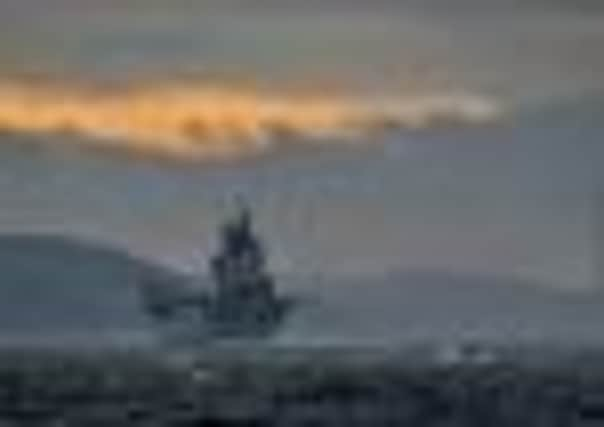Scottish independence: Country would lose warship contracts


The coalition government warned that if Scotland becomes a “foreign country”, defence contractors could no longer use Scottish yards in their bids.
Work on the new Type 26 Frigates and MARS vessels due to be built on the Clyde would be lost, along with work on the new aircraft carriers due to go to Babcock in Rosyth.
Advertisement
Hide AdAdvertisement
Hide AdThe two Clyde yards – Scotstoun and Govan – and Rosyth only deal with military orders and currently do not have orders from outside the UK, meaning that if the Ministry of Defence closed the door on Scotland the order books would be left empty. The admission came after union leaders met with ministers yesterday to discuss the future of Scotland’s shipyards following independence.


After that meeting the union representatives gave an account of their discussions to the Scottish affairs select committee. They told MPs that procurement minister Peter Luff had told them that if Scotland voted for independence then no Royal Navy ships would be built in the country.
Last night a Downing Street spokesman confirmed the position saying: “No British warship has been built in a foreign country for the last 50 years and we do not intend to start doing that now.”
Unite senior shop steward at BAE Systems in Scotstoun, Duncan McPhee, told MPs that without UK defence contracts the shipbuilding industry in Scotland “would be greatly reduced, or in fact - finished”.
He said that the yards had no orders from outside the UK and were reliant on contracts from the Royal Navy.
Regional secretary at the Confederation of Shipbuilding and Engineering Unions Kenny Jordan said there were “up to 16,000 jobs at risk” in the defence industry and its supply chain across Scotland.
Mr Jordan was critical of SNP ministers over their approach to the effects on the industry.
“We need to hear what they are going to do to replace these contracts because we have heard nothing at all,” he said.
Advertisement
Hide AdAdvertisement
Hide Ad“I don’t think they [the SNP] have thought about it at all.”
Raymond Duguid, Unite senior shop steward at Babcock Marine in Rosyth, said: “The worrying thing for me is that this is going to cost Scottish jobs.”
He told MPs that while ministers had praised Scottish shipyard workers, they had made it “very clear” that the quality of work would not save Scottish jobs, despite claims by the SNP that this would keep the industry alive.
Mr Luff and Scotland Office minister David Mundell, who met with union representatives, also pointed out that if contracts were made available for Scottish yards to bid for then, under article 316 of European Union regulations, companies from around the world would be allowed to compete. Currently, defence contracts can be limited to domestic companies under EU regulations.
The evidence was rejected by SNP Westminster leader and defence spokesman Angus Robertson who said MoD orders are already going abroad.
He said: “The scaremongering of Tory ministers has been sunk again. In reality, shipbuilders across Europe regularly get orders from other countries.
“France makes ships for Russia, and the UK has made frigates for Malaysia. The Type 26 destroyer, now called the Global Combat ship, has attracted interest from countries including Australia and Canada.
“With independence, Scotland would have a healthy order book. It is not the London government that makes the yards successful – it is the second-to-none Scottish skills base and technical expertise that brings orders to the yards, and that will continue under independence.”
Advertisement
Hide AdAdvertisement
Hide AdThe threat follows a warning by a leading defence expert at The Scotsman conference on the future of defence this week that the MoD would “want out” of an independent Scotland.
Professor Trevor Taylor of the Royal United Services Institute (RUSI) said it was “hard to see” why London would continue to send contracts to Scottish firms once it was a “foreign” country.
But Mr Robertson added: “[The Scotsman defence] conference just this week in Edinburgh suggested that a Scottish Navy would have about 20-25 ships and vessels, including frigates, offshore patrol vessels, minesweepers and various other miscellaneous assets – so independence will bring opportunities for our shipbuilding sector.”
A BAE spokesman said: “The question of an independent Scotland is not for BAE Systems. Our responsibility is to deliver on our commitments to the UK Ministry of Defence and our international customers.” Babcock declined to comment.
Tory Scotland Office minister David Mundell said: “The consequences of separation could be severe for Scotland’s defence industries. It is right and proper that the unions examine the issue and make a responsible assessment of how their members’ best interests can be met..”
The committee’s Labour chairman Ian Davidson, whose Glasgow South West constituency includes many workers employed in the shipyards, described the evidence as “extremely concerning”.